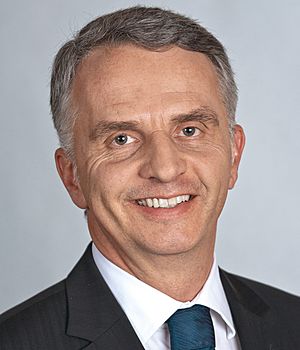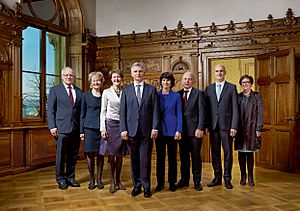Didier Burkhalter facts for kids
Quick facts for kids
Didier Burkhalter
|
|
|---|---|
 |
|
| Chair of the Organization for Security and Co-operation in Europe | |
| In office 1 January 2014 – 31 December 2014 |
|
| Preceded by | Leonid Kozhara |
| Succeeded by | Ivica Dačić |
| President of Switzerland | |
| In office 1 January 2014 – 31 December 2014 |
|
| Vice President | Simonetta Sommaruga |
| Preceded by | Ueli Maurer |
| Succeeded by | Simonetta Sommaruga |
| Vice President of Switzerland | |
| In office 1 January 2013 – 31 December 2013 |
|
| President | Ueli Maurer |
| Preceded by | Ueli Maurer |
| Succeeded by | Simonetta Sommaruga |
| Head of the Department of Foreign Affairs | |
| In office 1 January 2012 – 31 October 2017 |
|
| Preceded by | Micheline Calmy-Rey |
| Succeeded by | Ignazio Cassis |
| Head of the Department of Home Affairs | |
| In office 1 November 2009 – 31 December 2011 |
|
| Preceded by | Pascal Couchepin |
| Succeeded by | Alain Berset |
| Member of the Swiss Federal Council | |
| In office 1 November 2009 – 31 October 2017 |
|
| Preceded by | Pascal Couchepin |
| Succeeded by | Ignazio Cassis |
| Personal details | |
| Born |
Didier Eric Burkhalter
17 April 1960 Auvernier, Switzerland |
| Political party | Free Democratic Party (until 2009) FDP.The Liberals (since 2009) |
| Spouse | Friedrun Sabine Burkhalter |
| Children | 3 |
| Alma mater | University of Neuchâtel |
Didier Eric Burkhalter (born on April 17, 1960) is a Swiss politician. He was a very important member of the Swiss Federal Council from 2009 to 2017. This council is like the government of Switzerland.
He was part of the FDP.The Liberals political party. In 2014, he became the President of the Swiss Confederation. This is a special role that changes every year in Switzerland.
Didier Burkhalter was chosen for the Swiss Federal Council on September 16, 2009. He took over from Pascal Couchepin on November 1, 2009. At first, he led the Federal Department of Home Affairs. From 2012 to 2017, he was in charge of the Federal Department of Foreign Affairs. As President in 2014, he also led the Organization for Security and Co-operation in Europe (OSCE). He left the Federal Council on October 31, 2017.
Contents
Early Life and Political Start
Didier Burkhalter was born in Auvernier, a town in Switzerland. He started his political career in his home region. From 1990 to 2001, he was a member of the Grand Council of Neuchâtel. This is like a local parliament.
He also worked in the city government of Neuchâtel from 1991 to 2005. During this time, he was the Mayor of Neuchâtel several times.
National Politics
From 2003 to 2007, Didier Burkhalter was a member of the Swiss National Council. This is one of the two parts of the Swiss parliament. He was part of the Free Democratic Party until 2009. After that, he joined the new party called FDP.The Liberals.
In 2007, he was elected to the Council of States. This is the other part of the Swiss parliament. Two years later, in 2009, he was chosen to be a member of the Swiss Federal Council.
Role as President of Switzerland
On December 4, 2013, Didier Burkhalter was elected as the President of the Swiss Confederation for the year 2014. He received many votes from the Federal Assembly.
He officially became President on January 1, 2014. As President, he led meetings of the Federal Council. He also performed duties that a head of state would do in other countries. However, in Switzerland, the whole Federal Council acts as the head of state. The President is like the leader of the team. He could act for the whole council in emergencies. But usually, he was just the "first among equals," meaning he had no more power than his six colleagues.
Later Career and Retirement
Didier Burkhalter has a degree in Economics. He is married and has three children.
On June 14, 2017, he announced that he would leave the Federal Council. His last day was October 31, 2017. Ignazio Cassis took his place. In 2018, Burkhalter shared that he had different opinions from his colleagues on some important topics. These included arms exports to war zones and equal pay for men and women. He called these "fundamental values."
See also
 In Spanish: Didier Burkhalter para niños
In Spanish: Didier Burkhalter para niños
- List of foreign ministers in 2017
 | Delilah Pierce |
 | Gordon Parks |
 | Augusta Savage |
 | Charles Ethan Porter |


